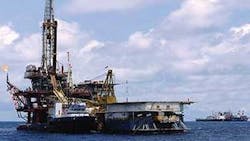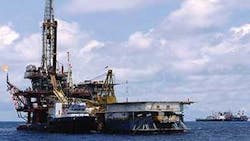Latest court ruling favors CMS Nomeco
At issue is whether an oil company’s royalty payments to a sovereign country can be garnished to settle a defaulted debt it was not a party to, and the significance of the decision to US oil companies doing business in developing nations.
Don Stowers, Editor, OGFJ
There have been some new developments in the ongoing dispute between oil producer CMS Nomeco, which operates in offshore Africa, and the hedge funds that have sued the company in an attempt to collect bad debts owed by the Republic of the Congo (also known as Congo-Brazzaville). A federal appeals court has ruled in favor of the oil company.
To recap, CMS Nomeco has had a contract with the Congo government since 1979 to produce offshore oil. The company pays royalties to the government in the form of crude oil from the offshore production.
In 1982, the Congo borrowed $35 million from a British bank for highway construction. Five years later, the country defaulted on the loan. More recently, hedge funds (aka “vulture funds”) acquired the bad loans for pennies on the dollar. These funds and an insurance company, having secured a judgment against a foreign nation, are attempting to collect on the judgment by garnishment - that is, by siphoning off the royalties that the oil producers pay the Congo in order to operate in that country’s offshore waters as part of their concession agreement.
A federal district judge in Houston ruled in favor of the hedge funds, saying that CMS Nomeco should turn over the oil it provides to the Congo as royalty payments to the hedge funds’ designated representative.
Courts in the Congo have ruled that the oil producers cannot divert the royalties to pay the bad debt that they refuse to pay. The country has even sent armed soldiers to the offshore installations to assure that the crude oil they receive for royalty payments is not diverted.
If you think this puts CMS Nomeco between a rock and a hard place, you’d be right.
The Houston court said the firm’s royalty payments should go to the hedge funds. The court in the Congo said they have to keep paying royalties if they want to continue to do business in that country. If they obey both courts, they are forced to pay twice - in effect paying off a loan that the Congo owes and that they were not a party to.
Andrew B. Derman, a partner in the Dallas-based law firm Thompson & Knight LLC, represents CMS Nomeco. He believes the case has critical implications for all US firms doing business in countries that have defaulted on loans, and he produced a list of 77 such countries that are either currently in default or are near default status.
Derman maintains that if US companies become guarantors of defaulted sovereign debt in foreign countries they will be at a clear disadvantage in competing against other countries in the international arena. Countries such as China and Russia are not likely to force their oil companies to pay double royalties, he said.
“CMS Nomeco had nothing to do with this loan,” said Derman. “It was simply trying to do business in Congo’s oil and gas sector. Most of the company’s production there is delivered to US refineries.”
Opposing view
As you might expect, the hedge funds have a somewhat different view of the case. Nick Snow, Washington correspondent for Oil & Gas Journal and Oil & Gas Financial Journal, was able to talk with hedge fund representatives recently.
“This is cookie-cutter litigation made incredibly complex by CMS Nomeco and the Congo’s refusal to pay,” said Ronald W. Kleinman, a managing shareholder of Greenberg Traurig LLP in Washington, one of the parties to the lawsuit. “If they win, there will be no further way for private banks to lend money to the Third World.”
Traurig went on to say that the US State Department has long considered any commercial activity by a foreign government, including receiving oil royalty payments, to not fall under the Foreign Sovereign Immunity Act (FSIA) if it is used commercially in the US. Therefore, the country would not be immune from litigation, he said.
He pointed out that the Congo’s government did exactly that for 15 years to pay an earlier obligation to National Union Fire Insurance Co. of Pittsburgh, another plaintiff in the lawsuit, under a federal court order in the Northern District of Illinois.
National Union, which was repaid on part of the debt, came back into the picture after it provided insurance to C. Itoh & Co. of Japan for machinery it sold to the Congo. When the government defaulted, Itoh collected on the policy, and National Union again went after the Congo for repayment, but was rebuffed, according to the insurance company’s attorney.
In all, three hedge funds and the insurance company are attempting to collect on the money they are owed by garnishment of royalty payments to the Congo.
Latest ruling
The Fifth Circuit Court of Appeals ruled that the lower court committed reversible error on three major points:
- First, the court concluded that the district court did not present facts to show that the Congo’s property (oil royalties) was not immune from collection procedures;
- Second, the court held that the Congo’s property must be located in the United States when the district court determines whether an exception to the FSIA exists; and
- Lastly, the court found that an exception to FSIA immunity does not determine whether the property is subject to garnishment under Texas law.
The court also found that the writs of garnishment the lower court had issued were issued without jurisdiction. In other words, the hedge funds lost this round and CMS Nomeco and its co-defendant, Nuevo Congo, both US affiliates of London-based Perenco Holdings, are breathing a collective sign of relief.
There are similar suits against US oil companies in several other jurisdictions around the country, says Derman, who noted that these plaintiffs also sued Murphy Oil Corp. and lost. Another case against Chevron Corp. has been appealed to the Ninth Circuit Court in San Francisco.
“Canada is in a similar situation where one of its oil companies has been sued,” said Derman.
Implications for oil industry
To head off further action on the part of the hedge funds, CMS Nomeco and Nuevo Congo have hired former US Rep. Geraldine Ferraro (D-NY) and the lobbying firm Global Consulting Group, where she heads the public interest practice, to intercede with Congress and the Bush administration in the case.
Speaking at a briefing in Washington in July, Ferraro said it might be appropriate for Congress to revisit the FSIA, which was passed in 1978, and examine how it affects a foreign country’s resources.
Ferraro told OGFJ’s Nick Snow, “There is very little sympathy for a government that doesn’t pay its debt. At the same time, when a country is trying to restructure its debt, it should have access to revenues from its natural resources.”
Derman added, “It might help the World Bank and the IMF restructure debt because vulture or hedge funds wouldn’t be able to grab foreign governments’ revenues or assets in this country.”
Economist Ray Perryman, president of the Waco, Tex.-based Perryman Group, has participated in several briefings with Thompson & Knight representatives, including briefings in Houston and Washington.
“The outcome of these rulings could have a chilling effect on the feasibility and willingness of US companies to deploy resources to developing and emerging nations,” said Perryman. “If it becomes substantially more difficult for US companies to develop oil resources in Africa, Latin America, and other emerging areas of the world, our nation’s effort to obtain a more stable energy situation will be severely curtailed.”
OGFJ correspondent Nick Snow contributed to this story.



